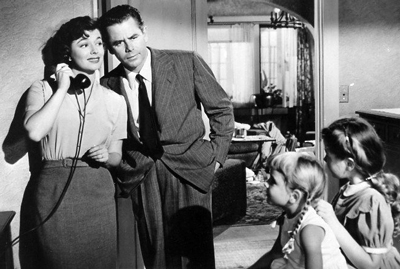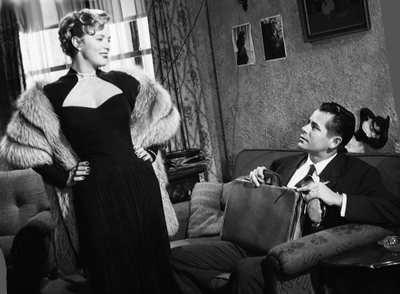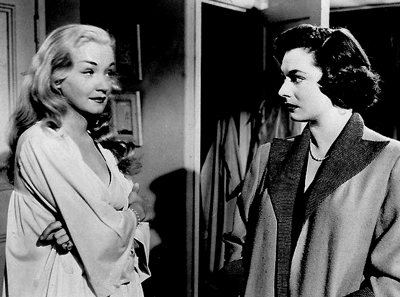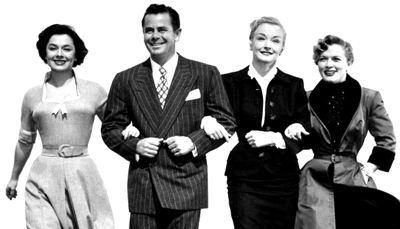
 |
|
|
|
Glenn Ford had a reputation for cooperation with studio heads. His filming schedules usually worked out well, but he stumbled for a couple of years in the early 1950s. In late 1951 he and Rita Hayworth were told they'd be the stars of the hottest project in town, James Jones' From Here to Eternity. By the time Ford was coming home from Europe and the filming of The Green Glove (aka The White Road), Harry Cohn's casting plans went up smoke. Rather than squawk, Ford did both Columbia and MGM's Dore Schary a favor by slipping over to that studio on short notice to work on another film with casting problems, Young Man in a Hurry. After twelve days' work, Broadway actor Russell Nype had 'suddenly left the production', so Ford's willingness to fill in was a big favor. Although the movie was not planned as an important release, it was to be directed by the respected Mitchell Leisen. 
The show didn't need a name director; it needed story work. A mild domestic comedy-drama that raises meaningful problems but solves them with baloney suitable for a sitcom, the movie that became Young Man with Ideas also isn't particularly suited to its two main stars. Glenn Ford's role seems more appropriate for a come-from-behind little guy hero... perhaps someone like Wally Cox, TV's Mister Peepers. Capable Attorney Maxwell Webster (Glenn Ford) is not being treated well by the Montana law firm of Edmund Jethrow (Ray Collins). Max's legal brains win a big case for the company but when he takes his wife Julie (Ruth Roman) to the victory celebration, his contribution is ignored while the partners congratulate themselves on a fiscal windfall. Julie gets drunk at the party and then suggests/insists that Max demand a raise and promotion. The meek Max complies, is fired, and not much later Max, Julie and their three children arrive in Los Angeles hoping for a fresh start. They take a rundown Hollywood courtyard bungalow. Its already-installed phone is a plus, but the number is the same as the previous tenant, a racetrack bookmaker, and calls asking to place bets come in constantly. Max searches for a fill-in job while taking a refresher course to pass the California Bar Exam. He's a flop at bill collecting, getting mixed up in the affairs of Dorianne Gray (Denise Darcel), a sexy nightclub singer. A fellow law student in his schoolroom is Joyce Laramie (Nina Foch), who initially tries to seduce him. Both 'extracurricular' women are good eggs who recognize Max's commitment to his family. Meanwhile, Julie becomes worried that Max won't pass the Bar. During an argument, the angry Julie inadvertently takes a racetrack bet, which puts gangster Brick Davis (Sheldon Leonard) on Max's case. He runs off to see Dorianne perform, and gets into a brawl when Brick Davis and his thugs show up to collect. When Max is hauled into court with the other thugs, he realizes that he's in a lot more trouble. If the state finds out that Julie took the racetrack bet, Max will never be able to practice law in California.... 
Although produced by MGM, Young Man with Ideas looks like a film for which nobody took artistic responsibility. The characters are woefully inconsistent. Glenn Ford's Max is a Clark Kent-like milquetoast who never stands up to anybody on the simplest issue. After showing him incapable of communicating effectively even with his own wife, in the last act the screenplay makes him suddenly turn into Clarence Darrow. For a light comedy the movie has a markedly realistic context. Max is all but broke and it's not easy to pay the bills without a good job. Places of employment are openly hostile (the collection agency) or, like the Montana law office, subsist by exploiting their employees. Max has two girls and a baby boy to look after. Audiences likely felt uncomfortable watching Glenn Ford act passive and impotent. He's bullied and flummoxed by a pushy housing agent and nervy deadbeat debtors, and doesn't know how to react to either of the women who throw themselves at him. Yet If the context was lighter -- as in Vincente Minnelli's Designing Woman, there might be no problem. But Young Man with Ideas takes place in a world of debts, humiliating jobs, marital discord and a serious criminal threat. Max's wife appears to lose faith in him altogether, and it's no joke. The image of the American family is depressing, especially since this film comes from the family-conscious MGM. Ruth Roman's Julie is a monster. She shames and belittles Max, gets roaring drunk in front of his peers and employers, and then forces him to make a job demand he doesn't feel comfortable with. Julie really becomes a jerk when she complains about everything in their realistically run-down bungalow. Most American movie patrons probably lived in accommodations that weren't much better. Julie doesn't listen when Max tries to explain that crooks might come after them. Actually, Julie refuses to listen to anything Max says, so he seems an even bigger idiot for staying with her. It's a case where some weak farce situations don't mesh with the characters or the realistic context. 
Perhaps a ditzy but nervy dame type like Ann Sothern could make sense of the Julie character. The gorgeous Ruth Roman isn't exactly a comedy natural no matter how hard she tries. Nina Foch and Denise Darcel have much better luck. Foch's law student Joyce is cute when she tries to smooch with Max, and makes a nice change to good friend when he turns her down. She even comes through for the Websters when their marriage is threatened. French import Denise Darcel's big Hollywood break fizzled when the town started to implode just as she arrived. Her best pictures remain William A. Wellman's Westward the Women and Robert Aldrich's Vera Cruz. MGM seems to have wanted to give her a good showcase, as her songstress Dorianne gets to chirp out two okay songs. Further down the cast list, Mary Wickes is properly annoying as a Hollywood stage mother, and the talented Donna Corcoran is Max's precocious ten-year-old daughter Caroline. Mitchell Leisen's direction shows none of his usual precision or finesse of his older Paramount shows. In an early scene it looks like Max is going to defy the Production Code by switching beds to climb in with his wife. When he reverses course at the last minute, there's no hint of humorous intent. But 1952 audiences would surely pick up on the moment -- people just weren't shown sharing beds in the movies, not even married couples. Leisen had always been in control of every detail, but it's possible that working for a new boss in a mid-level production didn't afford him the right to adjust the script or make creative demands. 
The movie's conclusion is both insipid and disturbing. Timid Maxwell suddenly becomes the Glenn Ford we know, an utterly confident Rock of Gibraltar. He weathers rough going in the courtroom and then triumphs -- in a silly case about a fight in a restaurant. The happy ending feels more than a little hollow. At the 'cute' finish, we almost hope that Max's fairly intelligent older daughter Caroline will assess the family situation, and run away to the circus. 1
The Warner Archive Collection DVD-R of Young Man with Ideas is a nearly perfect encoding of this nearly forgotten speed bump in Glenn Ford's career. Ford's fans might find it just as interesting as his more
On a scale of Excellent, Good, Fair, and Poor,
Young Man with Ideas rates:
Footnotes: 1. I cant help but blurt out spoilers on this one, so be warned. Max wins the simple court case (a full jury for a misdemeanor disturbing-the-peace rap) and the court erupts in cheers - all except the worthless Julie, who has abandoned Max once again because she knows he's going to lose. She's already convinced that he won't pass the Bar. Not only does the good news about the Bar come through right then and there, a big-time lawyer has been sitting in on the whole trial and is so impressed with Max that he hires him on the spot. When Max returns home beaming because he's now a gainfully employed provider, Julie's bad faith is dropped as if it never happened. The screenplay takes some situations very seriously, but ignores others. Lucille Ball wouldn't like this script -- it undermines all of its characters. Given the film's fairly realistic attitude toward the crime/gangster angle, viewers couldn't be blamed for expecting the underworld minions of Brick Davis to mark Max for death. This was blacklisted screenwriter Ben Barzman's last credit on an American-produced film for many years. The writer of the leftist films The Boy with Green Hair, Give Us This Day (Christ in Concrete), Stranger on the Prowl and Time Without Pity must have contributed to the screenplay earlier, because by 1952 he had already been blacklisted and was in Europe.
Could the story have originated as a more serious drama? Take away the misguided comedy and Young Man with Ideas might play as socially conscious criticism, about a worthy man held back by predatory employers. If Max's economic ordeal showed him tempted by other women while struggling to pass the bar, the movie would resemble Barzman's earlier Give Us This Day, a tragedy about another good man who (in the writer's opinion) can't get ahead in a rigged system.

Reviews on the Savant main site have additional credits information and are often updated and annotated with reader input and graphics. T'was Ever Thus.
Review Staff | About DVD Talk | Newsletter Subscribe | Join DVD Talk Forum |
| ||||||||||||||||||